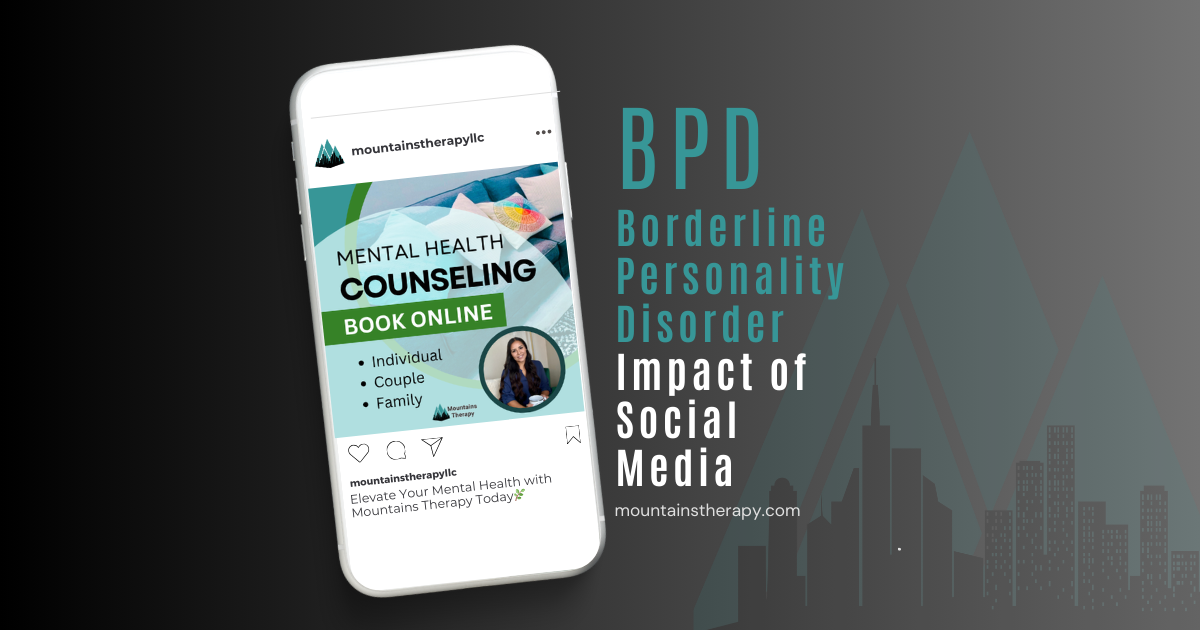Borderline Personality Disorder (BPD): Impact of Social Media and Therapy
Learn more about BPD Therapy here.
In This Blog, You’ll Learn:
- The impact of TikTok and social media on mental health, including its influence on perceptions of BPD
- Clinical features of Borderline Personality Disorder (BPD) as defined by the DSM-5
- How professional therapy, like BPD counseling at Mountains Therapy NJ, can help manage symptoms and improve emotional resilience
At Mountains Therapy, we recognize that in recent years, TikTok has become a hub for sharing mental health content, including discussions about Borderline Personality Disorder (BPD). While some creators provide helpful insights, others may oversimplify or misrepresent the condition. If you're wondering, "Do I have BPD?" it's essential to understand its clinical features as outlined in the DSM-5 and seek guidance from a professional, such as a BPD therapist near me or an individual therapist.
The Impact of Social Media on Mental Health
Social media platforms like TikTok have transformed how we access and share information about mental health. On one hand, they provide a sense of connection and validation for individuals seeking support, such as finding relatable stories about anxiety, depression, or BPD symptoms. However, the constant stream of content can also lead to overdiagnosis, self-comparison, and misinformation.
- For example: The "highlight reel" nature of social media can exacerbate feelings of inadequacy or emotional instability, especially for individuals struggling with a condition like BPD. Seeking guidance from a professional licensed therapist near me or engaging in mental health counseling is essential to balance the potential benefits and risks of social media on mental health.
What is Borderline Personality Disorder (BPD)?
Borderline Personality Disorder (BPD) is a mental health condition characterized by intense emotional instability, difficulty maintaining relationships, and impulsive behaviors. While these traits can make daily life challenging, they do not define who you are. BPD is diagnosed using criteria outlined in the Diagnostic and Statistical Manual of Mental Disorders (DSM-5), a resource used by mental health professionals to classify and diagnose mental health conditions based on symptoms and their duration.
According to the DSM-5, individuals with BPD may experience:
- Fear of abandonment: Extreme efforts to avoid real or imagined separation.
- Unstable relationships: Alternating between idealizing and devaluing others.
- Identity disturbance: An unstable sense of self.
- Impulsivity: Risky behaviors such as reckless spending, substance use, or unsafe relationships.
- Emotional instability: Intense mood swings that last a few hours to days.
- Chronic feelings of emptiness: Persistent emotional void.
- Intense anger: Difficulty controlling anger, leading to physical altercations or verbal outbursts.
- Stress-related dissociation or paranoia: Detachment from reality, particularly under stress.
BPD on TikTok: Is it Helpful or Harmful?
TikTok's short videos can make complex conditions like BPD seem overly simple. While many creators aim to raise awareness, diagnosing yourself based on a 60-second clip can be misleading. The platform is not a substitute for consulting with a licensed therapist near me or undergoing professional mental health counseling. Some popular content may focus on relatable experiences, such as "hot and cold" relationships or heightened emotional reactions, without addressing the full picture of BPD symptoms. This can lead to over-identification or even self-misdiagnosis, which might delay access to proper treatment.
How to Determine if You Have BPD
If you’re questioning whether you have BPD, consider these steps:
- Self-reflection: Review the criteria in the DSM-5 and assess whether you resonate with the symptoms.
- Professional evaluation: Schedule a session with a mental health counselor near me or a therapist near me for anxiety, depression, or personality disorders.
- Talk to a specialist: Professionals trained in psychodynamic therapy near me or CBT therapy near me can provide accurate diagnoses and personalized treatment plans.
At Mountains Therapy, we offer compassionate care for clients experiencing symptoms of BPD or related challenges. Our team specializes in CBT, psychodynamic therapy, and other evidence-based approaches to help clients manage intense emotions and build healthier relationships.
How a Therapist Can Help with BPD
Working with a therapist for relationship issues, emotional instability, or impulsivity can be life-changing. Here's how therapy can help:
- Identify patterns: Therapists trained in BPD therapy near me can help uncover and address triggers for emotional dysregulation.
- Develop coping skills: Techniques such as mindfulness-based therapy and cognitive behavioral therapy exercises are effective in managing impulsive behaviors and mood swings.
- Heal relationships: Learn strategies to navigate personal and professional relationships with greater stability.
- Address co-occurring conditions: Many individuals with BPD also struggle with anxiety, depression, or PTSD. A therapist near me for depression and anxiety can provide holistic care.
Why Choose Mountains Therapy for BPD Support?
At Mountains Therapy, our team is dedicated to providing personalized care tailored to your needs. Whether you're searching for the best therapist near me, a psychotherapist who understands your challenges, or a BPD specialist near me, we’re here to help. Take the first step toward healing by connecting with one of our compassionate professionals. Let’s work together to challenge negative thoughts, build emotional resilience, and embrace growth.











